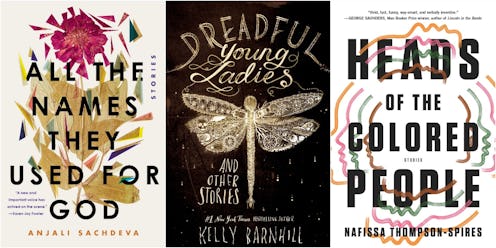Books
Want To Start Reading Short Stories? Try These 11 Collections By Women

If you think that getting into short stories is difficult, I totally understand. I've always preferred to lose myself in full-length novels. But so many short story collections have been released over the past few years — from Carmen Maria Machado's soon-to-be adapted for TV Her Body and Other Parties to Roxane Gay's Difficult Women to Lauren Groff's Florida — and I have grown increasingly interested in the prospect of sitting down with a large stack of short fiction collections at my bedside. If you're ready to dive into a new world of literature, I've got 11 picks below to get you started.
There has certainly been no shortage of incredible short story collections in 2018, so all of the books listed below were released in the past year, and all were written by women. But that's pretty much where the similarities end: these collections run the gamut from realistic to fantastical, eerie to heartfelt, interconnected and all over the map. So throw aside your trepidations about reading short stories. No matter what sort of fiction you're into, there is a collection below that will speak to you, excite you, and keep you enthralled until the very last page:
'Back Talk' by Danielle Lazarin
Back Talk examines how narrowly our culture allows women to express their desires through stories that are all about women’s hidden yearnings, and the unexpected ways they surface.
'Heads of the Colored People' by Nafissa Thompson-Spires
Heads of the Colored People shines a light on the simmering tensions and precariousness of being black with stories that engage in the ongoing conversations about racism, as well as the vulnerability of the black body.
'Better Times' by Sara Batkie
Better Times is divided into three sections covering the recent past, the current era, and the world to come, with all of the stories taking a look at whether the idea that so-called "better times" ever existed, particularly for women.
'Fight No More: Stories' by Lydia Millet
In Fight No More, Millet explores what it means to be home, offering insight into human behavior from the ordinary to the bizarre.
'Florida' by Lauren Groff
The stories in Groff's collection span characters, towns, decades, even centuries, but Florida — its landscape, climate, history, and state of mind — is the collection's gravitational center.
'How to Love a Jamaican' by Alexia Arthurs
Tenderness and cruelty, loyalty and betrayal, ambition and regret.... Alexia Arthurs navigates these tensions among Jamaican immigrants and their families back home. From close-knit communities to New York City, these stories form a portrait of a nation, a people, and a way of life.
'All the Names They Used for God' by Anjali Sachdeva
Anjali Sachdeva's collection spans centuries, continents, and a diverse set of characters but is united by each character's epic struggle with fate, exploring the isolation one experiences in the face of the mysterious, often dangerous forces that shape destinies.
'Awayland: Stories' by Ramona Ausubel
Ausubel's stories are set in small-town America, sunny Caribbean islands, and the very gates of Heaven itself. And though some of the stories are steeped in mythology, they remain grounded in universal experiences: loss of identity, leaving home, parenthood, joy, and longing.
'Dreadful Young Ladies & Other Stories' by Kelly Barnhill
Kelly Barnhill's collection of stories are filled with uncanny characters whose lives unfold in worlds at once strikingly human and eerily original. All feature bold, reality-bending inventions and are centered on universal themes of love, death, jealousy, hope, and more.
'You Think It, I'll Say It' by Curtis Sittenfeld
In her first collection of short fiction, Sittenfeld shares ten stories that upend assumptions about class, relationships, and gender roles and pinpoint the questionable decisions, missed connections, and sometimes extraordinary coincidences that make up a life.
'Belly Up' by Rita Bullwinkel
Belly Up is a collection that contains ghosts, mediums, and teenage girls who believe they are actually plants. Throughout these grotesque and tender stories, characters question the bodies they've been given and what their bodies require to be sustained.